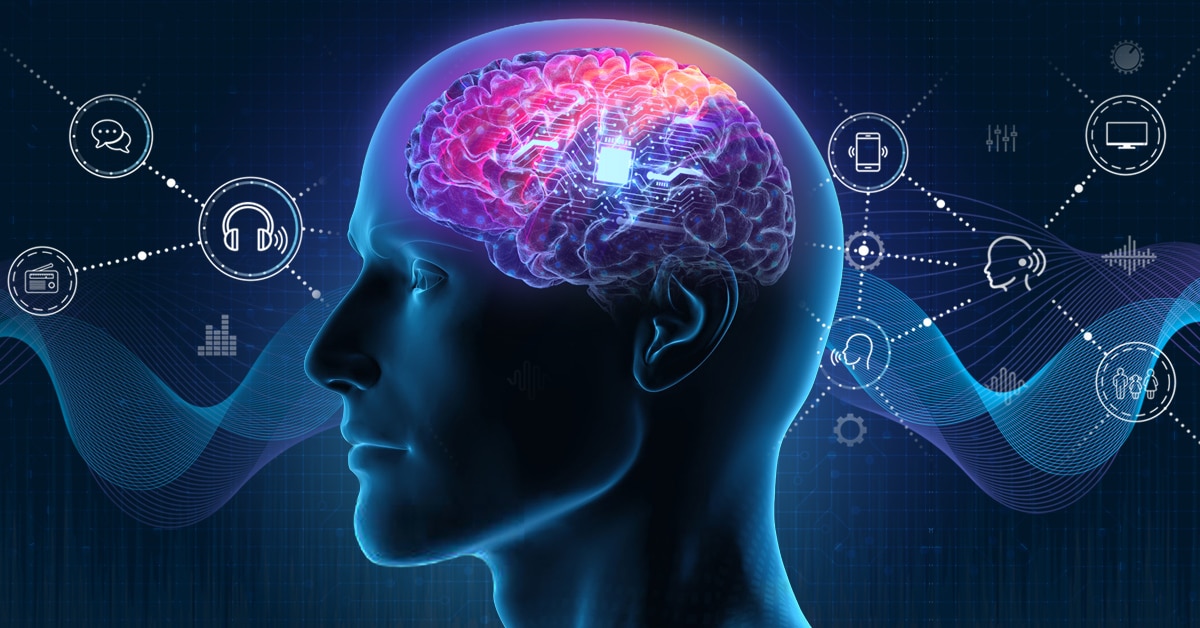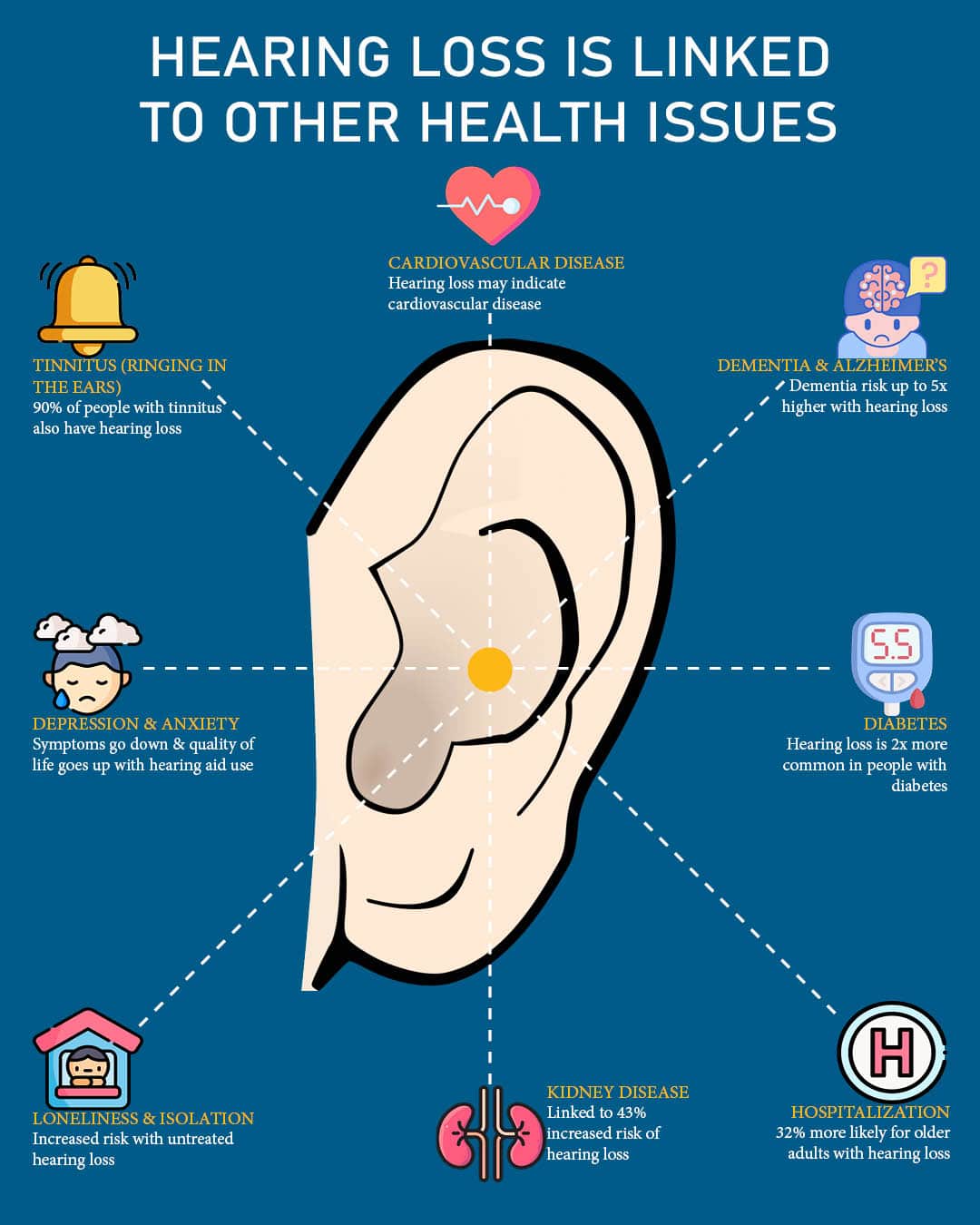
Hearing aid evolution
Just like our smartphones, computers, and tablets, hearing aid technology is evolving at a rapid rate. The majority of today’s hearing aid options are compact, sleek, and innovative. Depending on your specific needs and preferences, there are many options and styles to choose from. Most hearing aids can also connect to your smartphone, computer, or television through a wireless connection. This can significantly improve one’s quality of life. Rather than turn up the television volume, it streams right to your hearing device, delivering a clearer and more crisp sound while canceling background noise. This new evolution of hearing aid technology can make many of them very easy to wear and much less noticeable than those of the past.

Comorbidities associated with hearing loss
Hearing loss itself is a comorbidity that can be connected to many other comorbidities. There are six major comorbid conditions associated with hearing loss and include, but are not limited to depression, social isolation, cardiovascular Disease, diabetes, balance issues, and dementia. Other comorbidities linked to hearing loss such as fibromyalgia, anemia, psoriasis, rheumatoid arthritis, sleep apnea, and kidney disease.
For the sake of this article were going to only touch on a few of these. Cardiovascular Disease, balance issues, and dementia.
Cardiovascular Disease and hearing loss
Heart disease is one of the leading causes of death for both women and men. But did you know that heart disease is also linked to hearing loss? Research has shown that a healthy cardiovascular system maintains a healthy auditory system as well.
The Centers for Disease Control (CDC) has stated that nearly 610,000 people die each year in the United States, both men, and women from heart disease.
Most of the time, high blood pressure (hypertension) and/or narrowed arteries (arteriosclerosis) are linked to blood vessel damage-causing blockages, spams, or ruptures of both major or minor vessels. When this happens, it causes chest pain, stroke, or a heart attack. Other disorders of the heart’s valves, muscles, or rhythm lead to additional types of heart disease, like heart failure.

How is heart health and hearing loss linked?
The connection between heart health and hearing is linked by blood flow. Studies show that proper circulation plays a role in retaining good hearing health. Thus, if you have low blood flow and stress to the blood vessels within the inner ear, it can contribute to hearing loss.
Assistant Professor at the University of Mississippi Medical Center’s Department of Otolaryngology Charles E. Bishop, AuD, encourages Americans to take Cardiovascular Disease seriously. “Hearing health should not be assessed ina vacuum,” says Bishop. There is too much evidence that hearing loss is related to Cardiovascular Disease and other health conditions. We have to maximize the information we have to benefit the individuals’ overall well-being.”
Exercise may help
One of the best ways to help preserve your hearing is to adapt to a physician-approved fitness program that includes cardiovascular exercise.
Miami University discovered a positive relationship between hearing acuity and cardiovascular exercise. The study followed over 100 non-smoking participants in the age range of 22-78, whose hearing was elevated after riding a stationary bicycle. The researchers concluded that the participants with higher cardiovascular levels showed better hearing, notably among participants aged 50 and up.
Balance Issues and hearing loss
Our balance system relies on a multitude of bone and tissue located in the inner ear. It holds the semicircular canals, the otolithic organs, and the cochlea. Although the cochlea is used for hearing, the canals are used for balance. They look like three round loops, and each is in charge of sensing a particular movement. One senses up & down, another senses side-to-side, and the last sense tilt. When fluid inside of these tubes move, the hair cells feel the movement and send a signal to our brain. Our balance system is so responsive, it can even tell us when we are moving within a vehicle or elevator.
When problems occur inside the inner ear, it can mainly lead to balance issues, nausea, dizziness, and vertigo. These are severe issues that can impact how well we move. Our ears are engaged in more than just hearing, and the presence of the semicircular canals in our ears can lead to balance problems in people experiencing hearing loss.
Although hearing loss and balance problems do not always occur together, not everyone who suffers from balance disorders suffers from hearing loss. And not all who experience hearing loss have a loss of balance. However, they do occur in tandem from time to time. Furthermore, both Labyrinthitis and Menier’s Disease can result in hearing loss and balance problems.
How hearing aids improve balance
Hearing aids improve the quality and amount of sound reaching the eardrum; it allows the brain a better idea of one’s surroundings. People can identify auditory landmarks around them. This contributes to their sense of balance. While we are visual creatures, we rely much on the sounds around us, which give us an approximate idea of our surroundings. We can only see in one direction, but our ears can hear all around us.
When we lose our ability to hear and pinpoint sounds, it can make balancing more difficult. Hearing aids increase our sense of spatial awareness. People with hearing aids experience lower levels of anxiety and spend less time worrying about their surroundings. Studies have shown a link between hearing loss and mental illnesses such as dementia and depression, and hearing aids appear to help counteract the onset of these conditions or, at a minimum, alleviate the symptoms.

Dementia and hearing loss
People develop dementia for a variety of reasons, including vascular, neurodegenerative, and neuroimmune conditions. When it comes to hearing loss, less functioning hair cells means we receive less sound wave information sent to the brain.
The area of your brain in charge of hearing and processing auditory data may begin to operate differently when the hearing part goes away (or becomes strained), causing changes to how your brain is structured, which could be related to the effects of Alzheimer’s. Furthermore, hearing loss is one of the nine potentially modifiable risk factors contributing to nearly 35% of dementia cases, with hearing loss being the largest contributor at 9%. This means that 9% of dementia cases could be eliminated theoretically if all hearing loss were non-existent. There were no other contributing factors.
A study from Pelle and colleagues showed those with poorer hearing–even within normal levels– had more atypical activity in their frontal cortex when listening to spoken sentences. “A large part of the discussion had been around, if you have an older adult with hearing loss and you give them a hearing aid, does that help them?” Pelle says. “You’re never going to stop Alzheimer’s disease with a hearing aid, but you may help people to function better by supporting their cognition that way.”
Tying it all together
Now that we know about some of the major comorbidities associated with hearing loss. Understanding that most of the time when hearing is preserved it can negate many of the symptoms related to these issues. For many wearing hearing aids might make you think you’re getting older, but in fact, they are helping to keep you younger. We all want to spend more time with our friends and loved ones and go out and explore and live life without anxiety from social gathers due to fear of not being able to hear or track conversations. Or go for a walk without the stress of falling.
Having the right hearing aid for your individual need can impact your life in ways you never imagined. Far more people will notice you repeatedly saying “what” or “huh” than they will see that you are wearing hearing aids. Our patients report improved relationships and greater quality of life after being fit with hearing aids.
If you suspect you have any degree of hearing loss, reach out, and speak to one of our audiologists today to schedule your free consultation.
